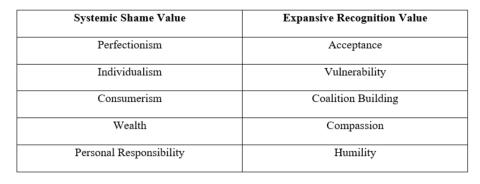Advertisement
Move Past Shame & Let Yourself Be Seen With These Psychologist-Approved Tips


What is the opposite of Systemic Shame? How do we learn to stop hating ourselves and judging other people while despairing about the future of the world? The rest of this book is all about answering those questions and exploring new ways of relating to others and ourselves.
Finding alternatives to Systemic Shame is a process that might prove to be lifelong for most of us, but it can be nourishing and worthwhile every step of the way.
Systemic Shame has many layers, and its messaging is everywhere we turn. So, the challenge we face isn't to find some way of shucking it all off at once, leaving behind a bold, unabashed version of ourselves who never harbors doubts or allows guilt to seep in. Instead, healing from Systemic Shame is all about developing resilience in the face of society's numerous shaming messages and developing more productive strategies for coping when we're feeling ashamed.
Moving beyond Systemic Shame also means working to build vulnerable relationships with other people, witnessing firsthand the restorative effects of being fully seen, and recognizing that even in its imperfections, humanity can be loved and trusted. Healing from Systemic Shame involves developing a sense of purpose and perspective in life, which will allow us to discern for ourselves what is best for us, even in the face of external judgment.
Soothing our Systematic Shame doesn't mean becoming immune to it; rather, it involves learning how to dodge and weave away from the constant psychological blows our culture deals us and finding safe people to run toward and embrace when it feels like we can't stay in the fight.
The antithesis to Systemic Shame is something that I've taken to calling expansive recognition, an awareness and acceptance of one's position in the larger social world. Expansive recognition is the reassuring and grounding sense that you are unbreakably connected to the rest of humanity, and that all sides of you, including your flaws, are part of what keeps you bonded to everybody else.
Expansive recognition is also the ability to find common ground within the struggles of another person, even when your outlooks and lived experiences differ significantly. Where Systemic Shame judges, expansive recognition respects. When Systemic Shame doles out obligations and expectations, expansive recognition acknowledges how much difficulty each of us has been facing.
And while Systemic Shame attempts to cleave us apart from one another with mistrust and fear, expansive recognition affirms that there are always ties that bind us together, especially in our lowest moments.
Systemic Shame is rooted in a variety of really damaging, contradictory values: an emphasis placed on individual morality, a tendency to blame victims for the suffering, the sense that a person's "worst" or most difficult qualities must always be hidden away, and a belief that society has no responsibility to look after other people.
Expansive recognition, in contrast, holds that people are indelibly linked to one another and that the only way for us to make it through times of danger and oppression is by holding space together. In the list below, you'll find some of Systemic Shame's core values and expansive recognition's alternative values, which exist to counter them.

Just like Systemic Shame, expansive recognition is both a feeling and a point of view. As an emotion, expansive recognition is the sensation of being witnessed and fully understood when you least expected it.
If you've ever revealed a closely held, shameful secret to a stranger only to discover they have been through the exact same experience as you, you're familiar with how expansive recognition feels. Or when a trait you've always felt self-conscious about is celebrated or lovingly joked about by friends. It's an incredibly warm, affirming feeling to discover that the parts of yourself you're the most frightened of are part of what makes you so lovable.
Expansive recognition declares that our battles are only won when we realize they are shared. It encourages us to open ourselves up and reveal our pain and to name when we are overwhelmed, so we can seek out the support we deserve. Expansive recognition tells us that even our feelings of crushing loneliness and self-disgust unite us and that no matter who we are or what limitations we are facing, we can build a life that's guided by our passions and our beliefs in what's right.
Here's a quick example to illustrate how the dialectic between acceptance and change can play out in DBT: Let's say a depressed patient struggles with a compulsive shopping habit. Instead of beating themselves up over the money they've spent and the resources they've consumed, the patient might benefit from accepting that they suffer from chronic depression and that shopping helps them cope.
Their shopping serves a purpose in their life, even if it's just helping them ignore how miserable they constantly feel. A DBT therapist might encourage the patient to accept the experience of their depression and sit with the potentially very frightening reality that they could suffer from low mood for the entire rest of their life.
If a lifetime with depression is the reality the patient is facing, then going on Amazon binges is just one of many strategies for coping with it that they could employ. It's probably not the ideal one, but this isn't an ideal reality. Shopping has obviously "worked" for them in some way. Maybe waiting for a package to arrive kept them going when thoughts of suicide were especially pronounced. Perhaps heading to the outlet mall gave them a reason to push through depressive fatigue and get out of the house.
Choosing to go shopping, under this framework, is neither inherently good nor bad: It's a decision that has a logic behind it, and that comes with benefits as well as costs. As a therapeutic technique, DBT opposes perfectionism: No coping strategy is inherently bad. It makes sense in certain situations, and it might increase or decrease the odds of a person's life getting better. We can choose to change if a coping mechanism no longer works, but we don't have to in order to become morally redeemed people.
This concept of holding acceptance and change in dialogue with one another is very useful when it comes to combating Systemic Shame. Systemic Shame operates under an unforgivingly black-and-white logic. But rather than demanding perfection of ourselves, we can evaluate each decision as a dance between acceptance and change, an ever-evolving negotiation with reality.
The truth is, I don't want to throw my hands up and conclude that fighting to save the planet is pointless because corporations pollute far more than I do. That doesn't feel any better than fixating for hours on whether I'm composting correctly. I want to feel less shame about being just one small, flawed person—but I also want to take action that I believe matters in this world. Under expansive recognition, we can both come to terms with our individual smallness and challenge the idea that our every effort is meaningless. When we see our small efforts as interconnected to the work and support of others, we become a lot more powerful (and our lives more meaningful) than individualism ever allowed us to be.
Excerpted from UNLEARNING SHAME copyright © 2024 by Dr. Devon Price. Used by permission of Harmony Books, an imprint of Random House, a division of Penguin Random House LLC, New York. All rights reserved. No part of this excerpt may be reproduced or reprinted without permission in writing from the publisher.


















